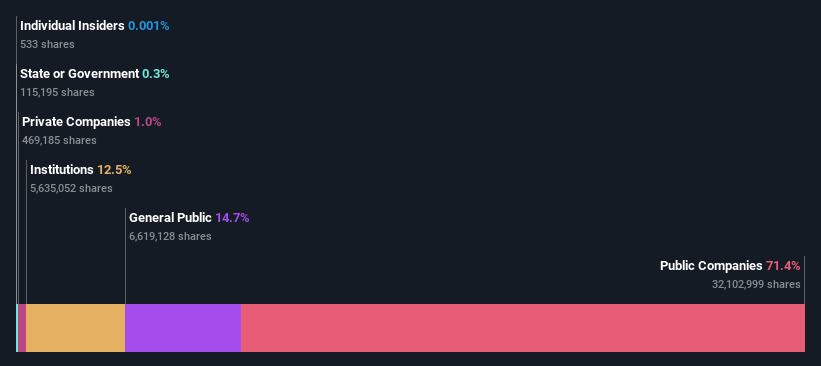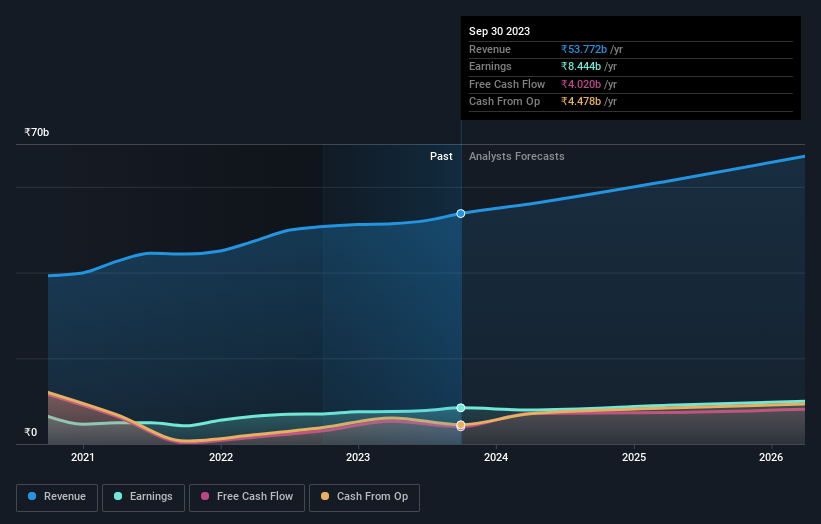Individual investors own 15% of Bayer CropScience Limited (NSE:BAYERCROP) shares but public companies control 71% of the company

Key Insights
- The considerable ownership by public companies in Bayer CropScience indicates that they collectively have a greater say in management and business strategy
- The largest shareholder of the company is Bayer Aktiengesellschaft with a 71% stake
- 13% of Bayer CropScience is held by Institutions
If you want to know who really controls Bayer CropScience Limited (NSE:BAYERCROP), then you'll have to look at the makeup of its share registry. The group holding the most number of shares in the company, around 71% to be precise, is public companies. In other words, the group stands to gain the most (or lose the most) from their investment into the company.
Meanwhile, individual investors make up 15% of the company’s shareholders.
Let's take a closer look to see what the different types of shareholders can tell us about Bayer CropScience.
See our latest analysis for Bayer CropScience

What Does The Institutional Ownership Tell Us About Bayer CropScience?
Institutions typically measure themselves against a benchmark when reporting to their own investors, so they often become more enthusiastic about a stock once it's included in a major index. We would expect most companies to have some institutions on the register, especially if they are growing.
As you can see, institutional investors have a fair amount of stake in Bayer CropScience. This can indicate that the company has a certain degree of credibility in the investment community. However, it is best to be wary of relying on the supposed validation that comes with institutional investors. They too, get it wrong sometimes. When multiple institutions own a stock, there's always a risk that they are in a 'crowded trade'. When such a trade goes wrong, multiple parties may compete to sell stock fast. This risk is higher in a company without a history of growth. You can see Bayer CropScience's historic earnings and revenue below, but keep in mind there's always more to the story.

We note that hedge funds don't have a meaningful investment in Bayer CropScience. The company's largest shareholder is Bayer Aktiengesellschaft, with ownership of 71%. This implies that they have majority interest control of the future of the company. In comparison, the second and third largest shareholders hold about 2.8% and 2.5% of the stock.
While studying institutional ownership for a company can add value to your research, it is also a good practice to research analyst recommendations to get a deeper understand of a stock's expected performance. There are a reasonable number of analysts covering the stock, so it might be useful to find out their aggregate view on the future.
Insider Ownership Of Bayer CropScience
The definition of an insider can differ slightly between different countries, but members of the board of directors always count. Management ultimately answers to the board. However, it is not uncommon for managers to be executive board members, especially if they are a founder or the CEO.
I generally consider insider ownership to be a good thing. However, on some occasions it makes it more difficult for other shareholders to hold the board accountable for decisions.
Our data suggests that insiders own under 1% of Bayer CropScience Limited in their own names. We do note, however, it is possible insiders have an indirect interest through a private company or other corporate structure. It is a pretty big company, so it would be possible for board members to own a meaningful interest in the company, without owning much of a proportional interest. In this case, they own around ₹2.9m worth of shares (at current prices). It is good to see board members owning shares, but it might be worth checking if those insiders have been buying.
General Public Ownership
The general public-- including retail investors -- own 15% stake in the company, and hence can't easily be ignored. This size of ownership, while considerable, may not be enough to change company policy if the decision is not in sync with other large shareholders.
Public Company Ownership
Public companies currently own 71% of Bayer CropScience stock. We can't be certain but it is quite possible this is a strategic stake. The businesses may be similar, or work together.
Next Steps:
While it is well worth considering the different groups that own a company, there are other factors that are even more important. For example, we've discovered 2 warning signs for Bayer CropScience (1 is a bit concerning!) that you should be aware of before investing here.
If you would prefer discover what analysts are predicting in terms of future growth, do not miss this free report on analyst forecasts.
NB: Figures in this article are calculated using data from the last twelve months, which refer to the 12-month period ending on the last date of the month the financial statement is dated. This may not be consistent with full year annual report figures.
Valuation is complex, but we're here to simplify it.
Discover if Bayer CropScience might be undervalued or overvalued with our detailed analysis, featuring fair value estimates, potential risks, dividends, insider trades, and its financial condition.
Access Free AnalysisHave feedback on this article? Concerned about the content? Get in touch with us directly. Alternatively, email editorial-team (at) simplywallst.com.
This article by Simply Wall St is general in nature. We provide commentary based on historical data and analyst forecasts only using an unbiased methodology and our articles are not intended to be financial advice. It does not constitute a recommendation to buy or sell any stock, and does not take account of your objectives, or your financial situation. We aim to bring you long-term focused analysis driven by fundamental data. Note that our analysis may not factor in the latest price-sensitive company announcements or qualitative material. Simply Wall St has no position in any stocks mentioned.
About NSEI:BAYERCROP
Bayer CropScience
Engages in the manufacture, sale, and distribution of insecticides, fungicides, herbicides, and various other agrochemical products and corn seeds in India, Germany, Bangladesh, and internationally.
High growth potential with excellent balance sheet and pays a dividend.
Similar Companies
Market Insights
Community Narratives



